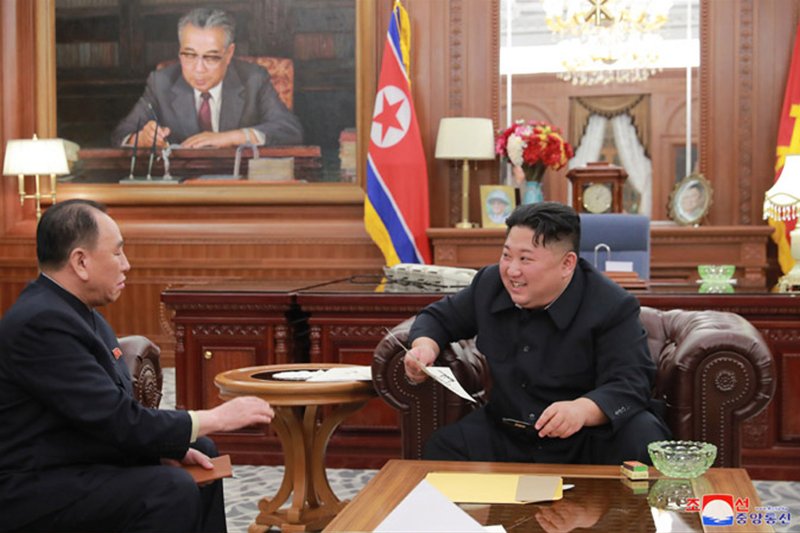1 of 3 | North Korean leader Kim Jong Un meets with Kim Yong Chol, lead negotiator for the second DPRK-U.S. summit which is scheduled to take place in late February on Thursday. Photo by KCNA/UPI |
License Photo
NEW YORK, Jan. 24 (UPI) -- A second summit between U.S. President Donald Trump and Kim Jong Un should be closely watched for a North Korean offer to denuclearize, but analysts say it is unlikely Pyongyang will give up weapons even as Trump plans to discuss the regime's "final, fully verified denuclearization."
Uncertainties are further exacerbated by troubles at home for Trump, who could be using the summit to distract from political deadlock and potential allegations of collusion with Russia, U.S. analysts told UPI.
Jonathan Cristol, a national security expert and research fellow at the Levermore Global Scholars Program at Adelphi University, said the Trump administration is setting impractical goals with its policy of fully verifiable denuclearization.
"We're talking about preventing North Korea from developing nuclear weapons," Cristol said. "That ship sailed long ago."
North Korea has ceased the highly public testing of nuclear weapons and ballistic missiles that escalated tensions in 2017 -- and while the regime is unlikely to use them against the United States or its allies in the foreseeable future, Kim does not need to be testing everything, nor is it in his best interest to denuclearize, the analyst added.
"But it's a manageable situation. You can have de-escalating steps," he said.
Mitchell Lerner, a historian at Ohio State University who studies U.S.-Korea relations during the Cold War, said Trump's approach to North Korea raises concerns.
Amid domestic turmoil in Washington and a monthlong partial government shutdown, Lerner said Kim could be watching the situation closely.
"Kim knows that Trump is in a politically weak position," Lerner said. "Trump is going to have to spin [the summit] as a success to shore up his base. He's going to try to sell it as a success."
Trump, in his political need, will "agree to anything" behind closed doors with Kim, the analyst added.
"Trump tends to do whatever he wants, sometimes spontaneously, and sometimes I think without fully understanding the complexity of the issues. I'm worried the United States will be taken to the cleaners."
Alliance hangs in the balance
Last year, the president's remarks in Singapore demonstrated he was willing to take uncalculated risks. His off-script comments culminated in a U.S. decision to suspend military exercises with South Korea, and the president even floated the idea of pulling U.S. troops from the peninsula.
Kyle Ferrier, director of academic affairs and research at the Korea Economic Institute in Washington, said Trump's past statements took allies by surprise.
His comments also show Trump is acting independently from the rest of his administration, Ferrier said.
"There is a disconnect between him and the administration, and the policy. You see that in the unilateral suspension of joint exercises," Ferrier told UPI.
The next test for Trump will come with a conclusion to the renegotiation of the Special Measures Agreement between Washington and Seoul.
The United States initially asked the South to pay $1.6 billion for U.S. troops, terms which Seoul rejected after 10 rounds of talks since March. Ferrier said a chief concern is Trump could blame the South Koreans for not being able to meet his longstanding demands, causing a rift in the alliance.
But Trump deeply misunderstands the relationship, Cristol said.
"South Korea already foots the bill, about 90 percent of the costs," he said. "It's cheaper for the United States to maintain forces there than here."
Lerner said the differing pace of North Korea negotiations, between the United States and the South, has caused friction.
Lerner, author of a book on the 1968 Pueblo Incident, said South Korean public opinion reflects increased skepticism about U.S. commitment to allies.
An unraveling of the bilateral alliance is not a major concern, however.
"It's unlikely to happen on a really fundamental level because of the history of the strong ties between the two countries," he said.
"But I'm certainly been more worried about the relationship than I have been anytime in my lifetime."















